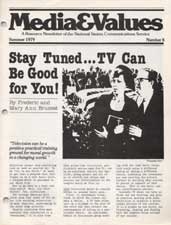Stay Tuned...TV Can be Good For You!
|
This article originally appeared in Issue# 8
|
"Television can be a positive practical training ground for moral growth in a changing world"
Christian values need exercising just as much as muscles do. To be "fit in the faith,' we need to get into a program that challenges us on a very basic level, a program which is grounded in our daily life.
How to do that in a busy complex world? Well, try television! Yes, television.
The average American will spend nine full years of his or her life watching television. In many families, televiewing is the thief home activity.
Despite criticism from many quarters that television is a 'wasteland, it is also true that prime-time television, particularly movies-made-for-TV, can be an excellent vehicle for families, young people and all of us to clarify our values and process our relationships to the complex world we 1ive in.
Good television helps to clarify values in several basic ways.
First, it introduces situations in which the viewer can make a choice. A TV show often sets up a dilemma in the plot of the story and then reveals the consequences of acting on a particular choice. An individual, family or discussion group working with the same basic situation could write a different ending by making a different choice, examining the consequences and carrying the process further by deciding what actions to pursue in support of that choice. This is the basic values clarification process.
Secondly TV shows can help us flush out our feelings and give us practice dealing with them. Television is actually a microcosmic picture of our culture. It is a window on our world, influencing, shaping and feeding back the complex value systems of our society.
It provides models of behavior, including standards for success and failure, examples of what is right and wrong, images of masculinity and femininity, etc. The things people are most concerned about eventually show up on TV, not only in the news, documentaries and talk shows, but also in the storylines of the series and the movies.
Television brings these issues home. The key ideas, conflicts, pressures and potentials which we as Christians are likely to encounter in our daily life come through in TV's stories. Watching TV then can be like an intensive training session for the exercise of our values.
Not all the important moral questions are there, to be sure, and you have to learn to be a selective viewer, but there is enough there to challenge even the most fit soul.
For example, several recent TV movies have dealt with subjects that many Christians are just beginning to grapple with. "Mary Jane Harper Cried Last Night" explored the problem of child abuse via the story of one mother and her child. "Intimate Strangers" presented the dilemma of the battered wife. The right of a lesbian mother to keep her children was the theme of "A Question of Love" and "Sooner or Later" focused on a young girl dealing with her first love.
Other notable TV movies in the last year have been "A Family Upside Down" about a couple coping with their aging parents; "See How She Runs" about middle-aged renewal; "Special Olympics" on mentally retarded children; and "Son-rise" on family care of an autistic child.
Oftentimes major moral questions are articulated in the plots of TV movies. A prime example was "In the Matter of Karen Ann Quinlan,' the true-to-life story of one Catholic family's soul-searching about the future of their comatose daughter.
Most recently, "Friendly Fire" did much more than explore one family's relationship to the Vietnam War. It provided a concrete insight into how people become fanatics, alienating themselves from others and blinding themselves to the truth.
Families and groups who use these 'instant curricula" for values clarification discussions at the dinner table or during special "values times" report much success in working through new moral concepts. Rather than splitting up the family by siphoning off the few moments parents and children have together, the television in these homes becomes a catalyst for the sharing of ideas, feelings and commitments.
Although movies-made-for-TV are the most consistent source of values-oriented media, there are others. If you read TV Guide carefully, an episode of a regular prime-time drama or situation comedy can be good.
Edith Bunker confronting a potential rapist in one episode of "All in the Family" for instance, documented, even between laughs, the trauma of middle-aged women whose personal integrity is threatened. (The recent 200th birthday special of 'All in the Family" demonstrated beyond doubt how a TV sitcom can tackle social issues in a positive way, and still rank high in the ratings.)
Mini-series like "Holocaust" or "Roots" can, of course, be the core of a whole series of discussions and activities developing the many themes of such shows.
Finally, feature films, whether on their first run in theatres, or playing the second time around on television, can bring into focus themes and issues that are still confusing to many. An Unmarried Woman, Interiors, The Deer Hunter and The China Syndrome are films that have helped "the movies" become much more than light diversionary entertainment. Those who still expect feature films to provide an "escape" from the daily world, are not yet aware of the influence of the filmmaker in our contemporary culture.
In times of stress, choices on how we are to live and what we believe must constantly be identified, activated and reformulated in daily life. Television, and other modern media, by reflecting the concerns of society and raising important questions, can become a catalyst for discussion. Repeated dialogue experiences about media can actually help people exercise their values and become a participant in the media experience rather than just a passive observer.



